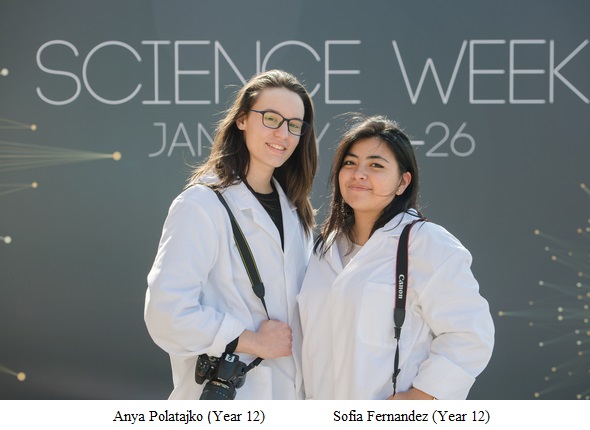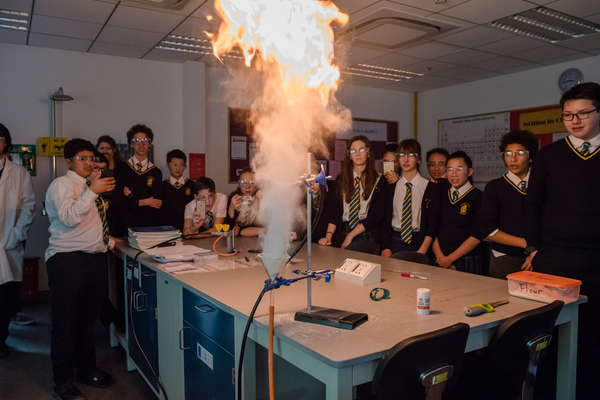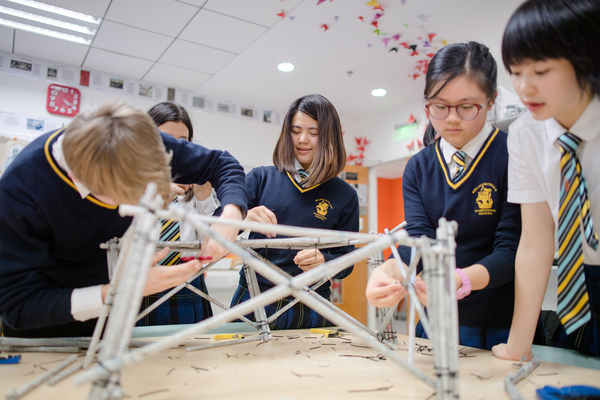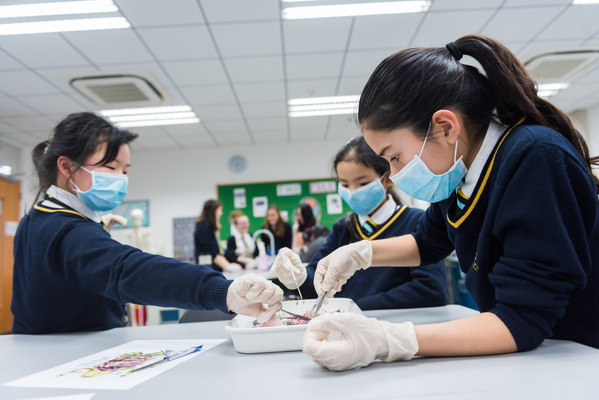Our pupil reporters investigate Science Week
08 Feb 2018
 22nd-26th January saw Wellington enjoy a week-long voyage of scientific discovery full of “eureka” moments for everyone involved. With such a packed schedule this year, it was all but impossible to catch everything going on. That’s why we sent year 12 reporters Anya and Sofia to investigate Science Week 2018 and find out what surprises and discoveries lay in store across the College.
During Science Week, the entire college came together to get a better understanding of how our world really works. We’ve seen how the smallest pieces of data can help solve a murder. We’ve dived directly into anatomy to see how living bodies work. We’ve looked ahead to the future of robotics and programming. We’ve witnessed how even a small chemical reaction can make a very big bang.
22nd-26th January saw Wellington enjoy a week-long voyage of scientific discovery full of “eureka” moments for everyone involved. With such a packed schedule this year, it was all but impossible to catch everything going on. That’s why we sent year 12 reporters Anya and Sofia to investigate Science Week 2018 and find out what surprises and discoveries lay in store across the College.
During Science Week, the entire college came together to get a better understanding of how our world really works. We’ve seen how the smallest pieces of data can help solve a murder. We’ve dived directly into anatomy to see how living bodies work. We’ve looked ahead to the future of robotics and programming. We’ve witnessed how even a small chemical reaction can make a very big bang.
 Together, we’ve all figured out that science affects practically everything!
Sadly, it would take far too long to describe all of the many things we saw and discovered, but the following selection of activities highlight just how varied and exciting Science Week 2018 was for Wellington pupils of every year group:
Together, we’ve all figured out that science affects practically everything!
Sadly, it would take far too long to describe all of the many things we saw and discovered, but the following selection of activities highlight just how varied and exciting Science Week 2018 was for Wellington pupils of every year group:
 In his “flashes and bangs” demonstration, Mr Deva showed us all how a carefully measured mixture of rather simple elements can have explosive consequences. A pinch of flour quickly became the fuel for a flamethrower, and a small mix of methane and oxygen was enough to blow a bottle right across the science lab. We quickly discovered that you must respect science to understand what it’s capable of… and that sometimes the best way to show respect is by wearing goggles and standing well back!
In his “flashes and bangs” demonstration, Mr Deva showed us all how a carefully measured mixture of rather simple elements can have explosive consequences. A pinch of flour quickly became the fuel for a flamethrower, and a small mix of methane and oxygen was enough to blow a bottle right across the science lab. We quickly discovered that you must respect science to understand what it’s capable of… and that sometimes the best way to show respect is by wearing goggles and standing well back!
 Mrs Philo demonstrated that with the right design, things can be made much stronger than they might first appear to be. During her sessions, pupils tried to design a chair using only newspaper, water and glue that could support the weight of a person. Of the seven groups in our session, they all came up with different designs, but only one chair was successful. This was no bad thing, because failed experiments only help to see where you went wrong and what you need to change to be successful next time.
Mrs Philo demonstrated that with the right design, things can be made much stronger than they might first appear to be. During her sessions, pupils tried to design a chair using only newspaper, water and glue that could support the weight of a person. Of the seven groups in our session, they all came up with different designs, but only one chair was successful. This was no bad thing, because failed experiments only help to see where you went wrong and what you need to change to be successful next time.
 It also sometimes helps to embrace science’s messier side and get stuck in. That’s exactly what both Senior and Prep pupils did when building bath bombs with Miss Abbott and investigating frog and pig organs in Miss Palakrishnan’s dissection lab. We were both very pleasantly surprised how confident and eager the younger pupils were to dive right in and explore the animal organs for dissection, with very little squeamishness being shown at all.
Throughout the week we also got to investigate the murder of Mr McKee by using all kinds of forensic analysis techniques straight out of CSI (Crime Scene Investigation). We went to the blood splatter analysis workshop where, led my Mr Lloyd, pupils were happily smashing watermelons to pieces with cricket bats, hockey sticks, hammers and more. This wasn’t just for fun: they were trying to determine which object caused the type of “blood” splatter most similar to the one found at the crime scene. While they all had CSI overalls on, we didn’t, so we kept well back from the carnage and took some aerial shots from above the courtyard.
We think that there are a couple of different reasons why the crime scene investigation was one of the most widely discussed activities during Science Week. Firstly, it helps that it was a fun, funny concept to see our teachers as potential murder suspects. Secondly, who doesn’t love a good mystery? Most importantly, it showed us how the proper scientific analysis of even the tiniest bit of data can be very important and can make a huge difference in the real world; in this case by solving a terrible ‘crime’!
These activities, as well as the many other amazing things going on during Science Week, gave all of us pupils the chance to explore science beyond textbooks. It showed that learning about science means getting stuck in, being hands-on while also being safe and respectful, often being precise but occasionally being a little bit messy. Above all though, it’s about being open to new discoveries by training our minds to be curious, analytical and persistent.
If we are curious, we’re keeping an open mind to different types of science and discovering how they affect our lives and our environment.
If we are analytical, we’re finding new evidence and running more tests to get the most accurate picture of the world around us.
If we’re persistent, we can keep trying, keep experimenting when things don’t go right the first time. Each failed experiment will give us more information that we can use to prepare for the next attempt. Every failure is just another step towards success, but only if we keep going!
We hope that you all enjoyed your own week of discovery and that it’s inspired you to keep on looking for the new and amazing things that are all around us, just waiting to be found.
It also sometimes helps to embrace science’s messier side and get stuck in. That’s exactly what both Senior and Prep pupils did when building bath bombs with Miss Abbott and investigating frog and pig organs in Miss Palakrishnan’s dissection lab. We were both very pleasantly surprised how confident and eager the younger pupils were to dive right in and explore the animal organs for dissection, with very little squeamishness being shown at all.
Throughout the week we also got to investigate the murder of Mr McKee by using all kinds of forensic analysis techniques straight out of CSI (Crime Scene Investigation). We went to the blood splatter analysis workshop where, led my Mr Lloyd, pupils were happily smashing watermelons to pieces with cricket bats, hockey sticks, hammers and more. This wasn’t just for fun: they were trying to determine which object caused the type of “blood” splatter most similar to the one found at the crime scene. While they all had CSI overalls on, we didn’t, so we kept well back from the carnage and took some aerial shots from above the courtyard.
We think that there are a couple of different reasons why the crime scene investigation was one of the most widely discussed activities during Science Week. Firstly, it helps that it was a fun, funny concept to see our teachers as potential murder suspects. Secondly, who doesn’t love a good mystery? Most importantly, it showed us how the proper scientific analysis of even the tiniest bit of data can be very important and can make a huge difference in the real world; in this case by solving a terrible ‘crime’!
These activities, as well as the many other amazing things going on during Science Week, gave all of us pupils the chance to explore science beyond textbooks. It showed that learning about science means getting stuck in, being hands-on while also being safe and respectful, often being precise but occasionally being a little bit messy. Above all though, it’s about being open to new discoveries by training our minds to be curious, analytical and persistent.
If we are curious, we’re keeping an open mind to different types of science and discovering how they affect our lives and our environment.
If we are analytical, we’re finding new evidence and running more tests to get the most accurate picture of the world around us.
If we’re persistent, we can keep trying, keep experimenting when things don’t go right the first time. Each failed experiment will give us more information that we can use to prepare for the next attempt. Every failure is just another step towards success, but only if we keep going!
We hope that you all enjoyed your own week of discovery and that it’s inspired you to keep on looking for the new and amazing things that are all around us, just waiting to be found. Related Articles

How learning a second language turns our pupils into powerhouses12 Jan 2024
As the world becomes more interconnected, learning a foreign language can provide students with a lifetime of benefits. From improved cognitive abilities to expanded career prospects, being proficien
Read More
_1709772027799.jpeg?x-oss-process=image/interlace,1/resize,m_lfit,w_1200/quality,q_90/format,webp)
Rest for success: Why sleep habits are important for your child23 Feb 2024
When it comes to helping your child grow, learn and reach their full potential, we often think of nutrition, physical activity and a supportive environment. But one factor that should never be underes
Read More

Wellington honours exceptional pupils on Fellowship Award Night30 Nov 2023
The future will bring with it immense challenges for our children. Their ability to adapt and forge connections across diverse fields of knowledge will determine their success. Resilience, self-aware
Read More




